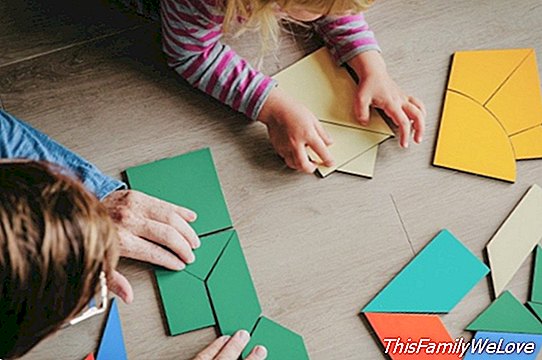How to teach children to be ordained through play

How many things must be taught to the More smalls of the house. Not only the basic ones: learning to speak, to read, to write, there are many other skills that should be instilled in children. But you do not have to think of them as lessons similar to what children have in school, these processes do not mean boredom, but can be very fun just by proposing.
An example of how you can enjoy learning and teaching is the game. Through these activities you can teach several skills to the smallest of the house, for example, the order. The pedagogue Celia Rodriguez offers these tips to make this process become something enjoyable where children and parents can turn important moments.
Learn to be ordered through the game
Playing can become an activity through which to learn to be ordered if it is used well. Here are some tips for this:
- Resorting to a song. Who does not like a good rhythm? There are many songs that can be used to internalize the lesson of order. Choose one, sing it with your child and when it's time to pick up, remember the lessons with this tone.
- Include order as one more part of the game. A game means following instructions, make that pick up the toys and leave everything as it was a point more.
- Do not allow playing with a new toy until the above is collected. Is the fun over with a toy? Great, you can change a doll for a ball, but first the child must pick up. You can explain that if you do not do it, you may not find what you are looking for later.
- Make them feel like leaders of an important role. Children should feel responsible for a great task: keeping their own room in order.
Other benefits of the game to be ordered
As we said the game can be a great choice when teaching skills and develop others. These are other benefits related to these activities:
- Fosters self-esteem. With the shared game, parents and children interact in a unique way, something that gives them security.
- Makes live positive situations of attachment and security, what facilitates the exchange of experiences and provides peace of mind
- Stimulates social and emotional skills. The family is the first environment where the child develops an image of himself and the world in which he lives. These interactions that occur in the family game improve social relationships and help explore these skills.
- Encourages emotional control. With these games children learn to influence others and also to regulate and control their emotions. They also begin to recognize affective signals and interpret the emotions of others.
- Encourages creativity and school success. The environment that is created with the game makes it possible for the child to relate creatively with the world. Your imagination favors and your ability to reason.
- Playing as a family helps improve social competence.
- Encourages the child's attention. The interaction with their parents in the game increases the concentration capacity of the child.
- Power the activity of children. Sharing playtime with children makes passive experiences active and enjoyable and eliminates the negative feelings associated with the former.
- Promotes child happiness. In fact, it is shown that parents who are quite involved in the play of their children are much more likely to raise happy children.
Damián Montero
Advice: Celia Rodríguez Ruiz. Clinical health psychologist. Specialist in pedagogy and child and youth psychology. Director of Education and Learning. Author of the collection Stimulate Reading and Writing Processes.




